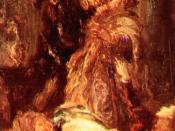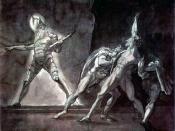In William Shakespeare's "Hamlet" there are four major soliloquies that reflect the
character of Hamlet.
In this paper I will be analyzing and discussing how these four soliloquies reflect
changes in Hamlet's mental state; his
changing attitudes toward life and the other characters in the play, particularly the
women; and his reflection on the
task of revenge that has been assigned to him. These four soliloquies are the backbones
of the play, and they offer the
audience a glimpse into Hamlet's mind and thought processes.
In the first soliloquy it is very obvious that Hamlet's sanity is in question. This is
apparent in the first four
lines of this soliloquy. " O that this too solid flesh would melt, Thaw and resolve
itself into a dew, Or that the
Everlasting had not fixed, His canon 'gainst self-slaughter, O God! God!" (42) These few
lines show that Hamlet is so
depressed that he wishes he could melt away into nothingness or commit suicide.
It is
also very apparent in this
soliloquy, that Hamlet is beginning to loath his mother for marrying Claudius only one
month after King Hamlet's
death. Hamlet loathes his mother and begins to loath all women, because he believes they
are all weak. "Let me not
think on't! Frailty, They name is women!" (42) Hamlet seems to view Denmark as a
metaphorical garden of Eden
which now totally corrupt, this can be seen when Hamlet says " Tis an unweeded garden,
That grows to seed; things
rank and gross in nature". (42) This soliloquy presents the audience a glimpse into
Hamlet's psyche, he is obviously
enraged at his mother's marriage, the state of Denmark, and he is still mourning his
father's death.
The second soliloquy is very intriguing and it helps to set up many events that happen...



Hamlet
Your essay made me more familar with the book...keep it up
2 out of 2 people found this comment useful.